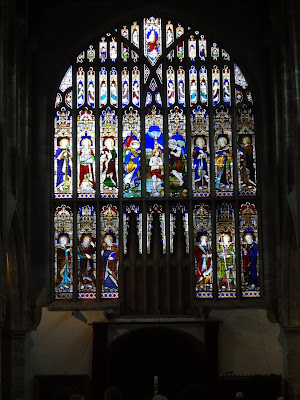You may wonder — and it's worth wondering — how it could be possible to find new ways to honour Shakespeare after 400 years of continuous production of his work and of the recognition of his place at the top of the list of acclaimed writers.
They managed. Today we went to see the big-screen presentation of the show they put together for April 23. It was filmed by the BBC — shown live in the UK — and is now playing around the world.
It's a two hour and 40 minutes show and when it was over, I said, "There wasn't one minute in that production that I didn't like." This is unusual; I'm no pushover.
The show was done at the Royal Shakespeare Company Theatre in Stratford.
The stage was in the centre, the orchestra was elevated behind the stage, there were several pathways leading offstage and there were balconies which were used by the actors for certain scenes. The audience was on three sides, on several levels, all tucked in quite close to the stage.
The show included everything. Some of the critics said when they heard there would be "something for everyone," they cringed and expected a "low-brow" evening of dumbed-down Shakespeare. That's a pretty snobby attitude but anyway, that's not what happened.
What they wanted to show us was Shakespeare and the wide and often direct influence he had on culture throughout the ages. The show included amazing scenes from the plays and beautiful and often touching renditions of the songs. But it also included broad comedy, high drama, Broadway music and dancing, ballet, opera, jazz, hip hop and Rufus Wainwright.
Each piece was either direct Shakespeare or a story inspired by his genius: West Side Story from Broadway, for example; Brush Up Your Shakespeare from Kiss Me, Kate (The Taming of the Shrew); a Duke Ellington composition inspired after he saw a play at Stratford in Ontario (Canadian content!); the pas de deux from the ballet Romeo and Juliet which followed the balcony scene from the play. When the dance ended, we could see Romeo and Juliet from the play, up on the balcony, watching with us.
A funny scene that got a lot of publicity at the time involved the well-known soliloquy from Hamlet. The current Hamlet from the Royal Shakespeare Company had begun to recite it when a director came out and made a suggestion about which word to emphasize — to be or not to be. The joke, which soon becomes obvious, is that more and more Hamlets begin to appear, all to offer their two-cents worth about which word to emphasize.
By the time they've all appeared, Paapa Essiedu has accepted advice from Tim Minchin, Harriet Walter, David Tennant, Benedict Cumberbatch, Rory Kinnear, Ian McKellen and Judi Dench — Hamlet the Dame, she declares.
But the final advice is yet to come. It may be considered that the Prince of Denmark could be well-played by the Prince of Wales and indeed, he was there and he joined the advice party.
You'll be glad to know that after the fun, all the Hamlets except Paapa Essiedu left the stage and he delivered the soliloquy with heart-touching feeling.
The show was efficiently run and well-paced. The hosts were David Tennant and Catherine Tate. They did a lovely job. (She looked very familiar to me and I couldn't place her until I got home and looked her up. She played Nellie in the American version of The Office.)
Helen Mirren made a short appearance near the end as Prospero from The Tempest:
Our revels now are ended./ These our actors,/ As I foretold you,/ were all spirits and/ Are melted into air,/ into thin air. . .
And David Suchet (best known as Hercule Poirot) and Judi Dench appeared as Oberon and Titania from A Midsummer Night's Dream as the celebration ended.
There was so much more. I could sit here for hours, telling you every detail of the show. I won't though but if you can get to see it, I recommend it. I can't imagine that you wouldn't enjoy it.






























